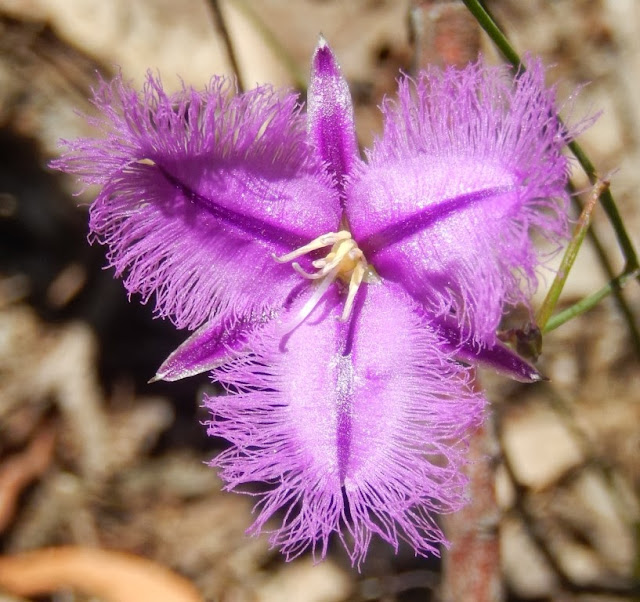It can be a
roller coaster ride of emotion when you care deeply about your area. Today we
celebrate 8 flowers of Fringe-Lily (Thysanotus
tuberosus), a perennial herb in the bushland above our drive while moods
plummeted last Saturday as we oh-so-carefully poisoned leaves of Nectaroscordum, an onion relative far
too vigorous and spreading – everywhere! – hoping we were not harming little
skinks, birds and frogs, but catching the bulb before it reached the forest.
Our long wet
spring has lengthened the flowering season of many a plant and may have delayed
the onset of this Fringe-Lily, which I generally find starts to bloom just when
I want to mow the grass below the house prior to the hot summer season, as
bushfire fuel reduction. These flowering ones, however, are safe: there is no
grass, just dirt and a few herbs where horses trampled more than 20 years ago
before we arrived. Suddenly it’s a positive: we can leave the little lilies to
seed.
Like their
colour, which stands out, I’ll go imperial for a moment: they stand at one foot
high (almost 30cm) and while the flowers last one day, they are replaced by
another and another…
This delicious
little lily seems to love this sunny spot. Fringe-Lily may not have the vanilla
scent of its cousin Chocolate Lily (Arthropodium)
but I think it prettier and, frankly, any plant that can flower into an
Australian summer has earned my admiration. (I am in the foothills of the
Dandening Ranges; it’s just as hot as Melbourne in summer.)
Fringe-Lily is
available from Kuranga Native Nursery and would be nice in a Christmas
stocking, so to speak. After all, the tuberous root is edible – although that
would be a waste.
Jill Weatherhead is garden designer, horticulturist
and principal at Jill Weatherhead Garden Design www.jillweatherhead.com.au) working
in Melbourne, the Dandenong Ranges and Victoria.

No comments:
Post a Comment